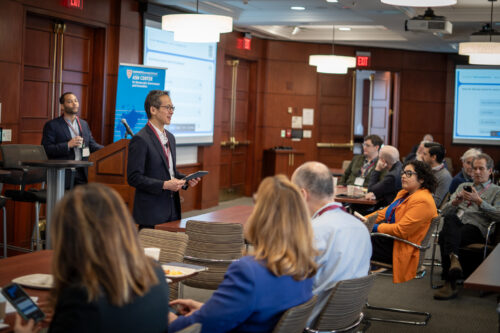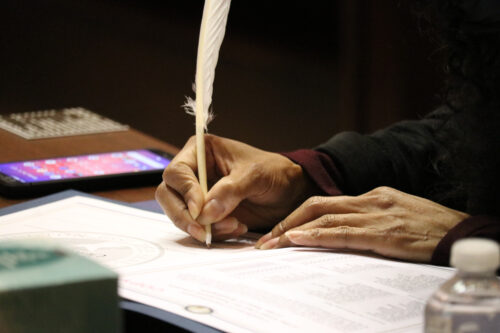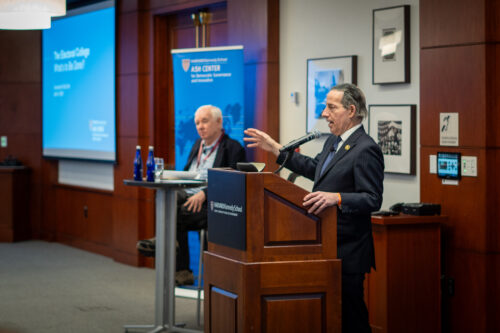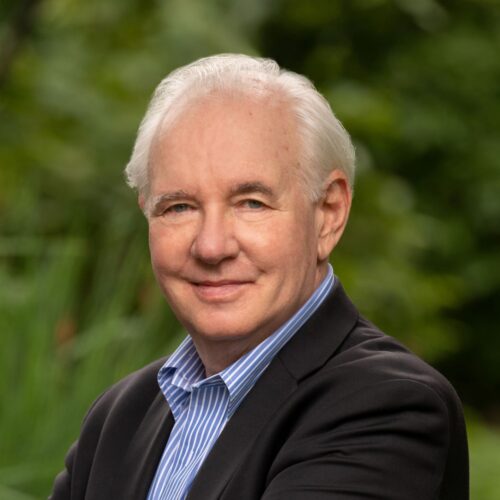
Video
Feature
During an opening panel at an Ash Center symposium on the future of the Electoral College, scholars examined the history behind how the US adopted its peculiar centuries-old system of choosing presidential election winners – and what should be done to reform or even abolish the practice today.
Below are excerpts from the opening panel of Electoral College Symposium: What’s to be Done? A recording of the panel can be found here.
“One of the biggest challenges of tackling this question of the Electoral College is the fact that we’re doing so at a point in time when it’s definitely broken. It’s dysfunctional because the size of the House of Representatives was capped a hundred years ago. And so the Electoral College and the House both should have grown consistently over time as the population grew. The consequence of this is that the weighting, the relative balance between small states and big states has changed over time. Hence the increasing frequency of the divergence between the popular vote and the electoral college vote — that is a real problem.”
“So they got to a solution once, which was electoral college and they locked in a deal for how they were going to divvy up power and we’re stuck with it…So that’s why again, the issue comes back to the state of states in our politics. Do they still in fact represent groups of people with some kind of meaningful shared interest? That doesn’t mean they all have to vote the same way.”
“There have been an enormous number of efforts to get rid of the Electoral College order or to reform it. And they date back to 1802, maybe even a little bit earlier.”
“There have been more than a thousand amendments introduced into Congress to get rid of or reform the Electoral College more than on any other subject in American history. Notably, some of the most important advocates of a national popular vote in Congress, probably a majority of the most important advocates have been from small states.
“This was not New York trying to ride rough shot over North Dakota. In fact, in the 1940s, the leading champion of a national popular vote was from North Dakota. But what made a national popular vote impossible to pass or difficult to pass, and really a non-starter for most of our history was racial supremacy, was white supremacy in the South…Southern states would have lost a lot of weight in presidential elections if there was a popular vote, because if there’s a popular vote — only voters count, not the three-fifths of African-Americans who count towards electoral votes but don’t vote. So you would eliminate that strength in the South.”
“After the Civil War and the brief period of Reconstruction when white supremacy is restored to the South, at that point in effect, white Southerners benefited from what you could call the ‘five fifths clause.’ African-Americans counted a hundred percent towards representation and Congress and towards electoral votes, but they didn’t vote at all. So in fact, the South was advantaged by this, and the South would have lost a great deal of influence in presidential elections if there had been a switch to a national popular vote from the electoral college system, which gave them weight and power regardless of the narrowness of the franchise that they offered.
“But what’s notable from the historical record is that the times that we have come closest to Electoral College reform were times when the party systems were in flux. During the 1810s and 1820s, there’s only one party, the Republican Party, that’s four different factions or five different factions. But the Federalists had disappeared. There was no sort of simple partisan dichotomizing of the political system. And the second time, the 1969 episode that I was referring to is also a period when I would argue there was really no effective two-party system. The party system was in flux, southern whites were leaving the Democratic Party and entering the Republican Party…. So party flux seems to open up space for possible Electoral College reform.”
“We can all agree that the Electoral College violates political equality…. by favoring some citizens over others, depending solely upon the state in which they cast their votes for president. And of course that allows the candidate who comes in second in the popular vote to win the election — and these consequences are indisputable. It’s simple arithmetic.”
“The question becomes, does the electoral college offer compensations for violating the most deeply ingrained democratic principles? Now, defenders of the electoral college say that it does, that it provides important benefits to the American policy and that it protects the nation from the dire consequences of direct election of the president. It is important to note that defenders of electoral college virtually never engage in rigorous arguments or offer systematic evidence on behalf of their claims. Instead, they make unsupported assertions, which unfortunately have been accepted by many people. So if we’re effectively to advocate reform, it’s crucial that we have answers to their claims.”
“Some argue that we should simply defer to the isdom of the Framers, in effect, including they knew what they were doing when they established the Electoral College. They were wise men. Whereas there were only men and therefore, and of discussion. But of course we now know that that’s nonsense.”
“The Electoral College does not prevent tyranny of the majority. Instead it provides the potential for tyranny of the minority. Now the electoral college is organized by state and you might think, well, it’s essential element of American federalism as defenders of Electoral College claim. But the Electoral College is not a federal principle. The founders never discuss it, not once, not one sentence.”
Excerpts have been lightly edited for length and clarity.
Video
At the Ash Center, Congressman Jamie Raskin makes the case that the US should finally move to a direct popular vote for selecting presidential winners.
In his latest book, "Why Do We Still Have The Electoral College?" Alex Keyssar examines the myriad reasons that we still follow with what he calls, "a process that does not conform to democratic principles the nation has publicly championed."
Podcast
White House reporter Annie Linskey offers a closer look at how the Trump White House makes decisions and what recent actions reveal about its strategy.
Podcast
Jonathan Rauch joins the podcast to discuss why he now believes “fascism” accurately describes Trump’s governing style.
Podcast
Drawing on new data from more than 10,000 Trump voters, this episode of Terms of Engagement unpacks the diverse constituencies behind the MAGA label.
Podcast
White House reporter Annie Linskey offers a closer look at how the Trump White House makes decisions and what recent actions reveal about its strategy.
Additional Resource
In a new essay, The Case for Building an AmeriCorps Alumni Leadership Network, Allen Lab Policy Fellow Sonali Nijhawan argues that the 1.4 million Americans who have completed national service represent an underleveraged civic asset. Drawing on her experience as former Director of AmeriCorps, Nijhawan outlines a roadmap for transforming dispersed alumni into a connected leadership network capable of reinvigorating public service, rebuilding trust in government, and strengthening civic participation.
Article
Economists and policy analysts broadly agree that more housing needs to be built in order to reduce costs in America’s most expensive cities. Using a novel survey of mayors of mid-sized and large cities to explore mayors’ views on the roots of America’s housing crisis and what solutions they believe will most effectively address their constituents’ housing challenges, the authors summarize mayors’ attitudes and perceptions on key issues related to expanding the housing supply, reporting how well these views correlate with mayors’ assessments of their own cities’ supply needs.





